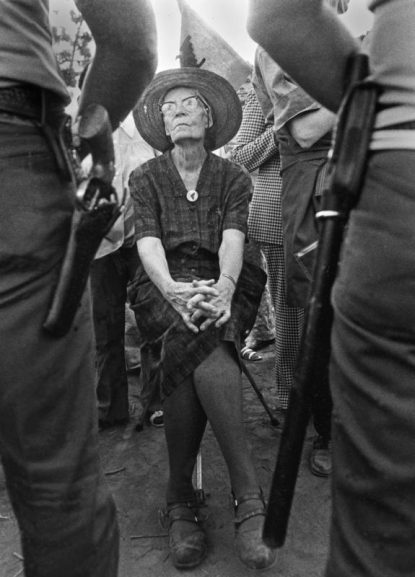
This is a still from the “Revolution of the Heart: The Dorothy Day Story,” a film by Martin Doblmeier. (CNS photo/courtesy Journey Films)
WASHINGTON (CNS) — Dorothy Day, whose life was a series of seeming contradictions, might be bemused at this one: The DVD version of a documentary about her life has, more than a month before the film reaches the PBS airwaves, made it to the top spot on the Amazon documentary sales chart.
Of course, to make it to the top spot, people have to buy “Revolution of the Heart: The Dorothy Day Story,” which means they have the disposable income to buy it. That would seem to go against Day’s own embrace of voluntary poverty as the co-founder of the Catholic Worker Movement, which dominated her life for nearly a half-century.
Martin Doblmeier, who made the film, is fully aware of the many contradictions in Day’s life and legacy, having spent two years assembling the documentary.
“She’s a very traditional Catholic. She’s not a religious leftist, as (Sojourners founder) Jim Wallis says in the film, but is comfortable with that. But she has to be called a political and social radical. That’s a dangerous combination,” Doblmeier said in a Jan. 28 phone interview with Catholic News Service.
Doblmeier noted one of the most famous quotations of St. Augustine: “Our hearts are restless until they rest in thee, O Lord.” “Dorothy Day is a classic example of that,” he said. “It’s amazing how restless she was, and latched on to the Catholic story line in her late 20s, and once she connects to that, she does not stray.”
[hotblock]
Day herself uttered her own famous quote: “Don’t call me a saint. I don’t want to be dismissed that easily.” Yet, 40 years after her death in 1980, there is a Dorothy Day Guild in New York advocating for her canonization — another contradiction.
Doblmeier said there are arguments against making her a saint, which include her abortion and her two suicide attempts. But “the vault of Catholic stories is filled with stories of those who were lost but then were found,” he noted, St. Augustine and St. Francis of Assisi among them.
Others say “she received too much resistance from the church at the time she was alive. She often found herself in tension with the Catholic Church, and they don’t want the church to claim her,” Doblmeier said. Others oppose sainthood because, to them, it would represent “some sort of domestication of Dorothy Day, as if the idea that you have her on a refrigerator magnet,” he added.
His own take? “I think she should be canonized.”
(Learn more about the film’s production company, Journey Films, and watch a trailer for the documentary below:)
Doblmeier said Day first started coming to his attention when he was working, as he says, “as a cub reporter for the Providence Visitor,” the statewide Rhode Island diocese’s newspaper, since renamed the Rhode Island Catholic.
The first few minutes of “Revolution of the Heart” go at a breakneck clip. “We do make it move pretty quickly,” he told CNS. “Once we get out of the funder credits, then we can create a different kind of rhythm for the film. We, like everybody else, listen to the people at the network: You’ve got to grab them in the first three minutes, you’ve got to give them a good sense of where they’re going for the next hour.”
[tower]
While Doblmeier got a good bit of his funding from the Lilly Endowment, its grant is contingent upon receiving matching funds elsewhere. The U.S. bishops’ Catholic Communication Campaign contributed a sizable chunk of matching grant funds. “I have to have total editorial control; I have to say the CCC was OK with that,” he said. “They know me, they were willing to help us out, to get this one film made.”
Doblmeier’s done 35 documentaries, several with the help of CCC grants, since leaving journalism and commercial broadcast television. “The ideas are there,” he said. “The only shortage is the funding.”
He may save some money by narrating his own films. But Doblmeier scored a coup by getting Oscar-winning actress Susan Sarandon to bring Day’s words to life on the screen, most of them from Day’s autobiography, “The Long Loneliness.”
“I asked her,” Doblmeier said of Sarandon. “I even said this to her: ‘This may sound like the prom, but you were my first choice. Not because your voice sounds so identical to the voice of Dorothy, but you’re an actress and you can bring the drama to this.’ She said yes, she was willing to do this. It took a while to get through all of her people,” he chuckled. “We did it in a recording studio in New York City, and she was most agreeable.”
The PBS release date is March 6, a Friday, but it’s wise to check local listings for air dates and times. “Public television is bit like herding cats,” Doblmeier said. “They know we’re promoting it for that (date). It will air repeatedly over the next many years. … The multitude of times the film will air is what will bring the audience numbers up.”
For those who can’t wait, the DVD includes extras, like the effort behind Day’s canonization cause, more interviews — interview subjects include two of Day’s granddaughters, now both in their 60s; Cardinal Timothy M. Dolan of New York; and actor Martin Sheen, who co-starred in a 1997 film treatment of Day’s life — and a visit to a Catholic Worker home in Washington. When Day died, there were 30 such Catholic worker homes. Now, they number close to 250.
PREVIOUS: Spy-vs.-spy game play makes Cold War cool
NEXT: ‘The Photograph’ takes a sharp, but flawed, view of romantic love



Share this story